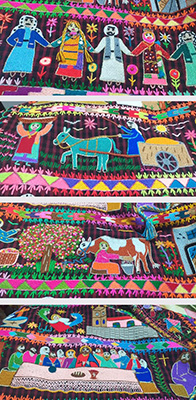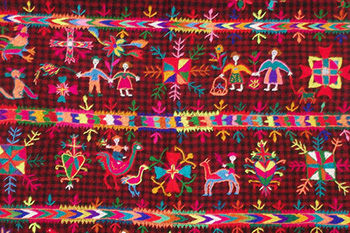From Our Archives
Dan Clendenin (2022) “The Coldest Monster”; Debie Thomas (2019) “Tell Us Plainly”; Debie Thomas (2016) “Belonging”; Dan Clandenin (2013) “I Should Not Call Any Man Unclean"; Dan Clendenin (2010) “From the Old Eden to the New Jerusalem: Revelation and 'The Healing of the Nations'"; Dan Clendenin (2007) "Every Tribe, Every Tear: 'The Healing of the Nations'".
This Week's Essay
CONGRATULATIONS: JWJ staff writer Amy Frykholm is in New York City this week attending the PEN America awards ceremony on May 8. Her newly released novel High Hawk (University of Iowa Press) was long listed for the PEN Hemingway award.
"He gave her his hand and helped her up. Then calling the saints and widows, he presented her alive." Acts 9:41
For Sunday May 11, 2025
Lectionary Readings (Revised Common Lectionary, Year C)
Psalm 23
Revelation 7:9-17
John 10:22-30
On this fourth Sunday of the Easter season, the lectionary gives us the first resurrection story following the Ascension of Jesus. Peter is called to Joppa (modern day Tel Aviv) to a community that has just experienced the death of one of its faithful members, a woman named Tabitha who "was abounding in charity and good works" (Acts 9:36). The widows of the community gather around Peter to show him the clothing that Tabitha had made. There is something they want Peter to know about Tabitha, and that something is in this clothing.
Peter ushers them all out of the room, and when he is alone with the body, he raises her from the dead.
This passage is full of unanswered questions: Who was Tabitha? Why are both of her names given, one in Aramaic and one in Greek? Why do the women want to show Peter her clothing? Why is she the only person in the Book of Acts that Peter raises from the dead?
In Stephanie Saldaña's book What We Remember Will Be Saved, Saldaña visits refugees from the Middle East to ask them what they carried with them when they fled. For the most part, she sees the fragments of a lost world: a recipe, a musical instrument, a story, a song. In Jordan, Saldaña meets with Iraqi refugees from the village of Qaraqosh, not far from the border with Iran. As in Tabitha's story, the women gather around Saldaña to show her something that contains a powerful form of what we might call in theological terms anamnesis, a kind of "re-membering" that makes what has been lost mysteriously present again.
 |
|
The ancient language of the shal.
|
In this case, the women bring Saldaña a shal, a traditional dress that a woman named Hana has elaborately embroidered with depictions of the village that all the women have lost to war. There are two churches, dancing figures, trees, animals, and a word in Syriac. "This is our history," the women tell Saldaña. They then read the dress for her, showing her that it is a map of what was lost.
The women have two names they want Saldaña to know. One is the Turkish name of their town, the name she already knows, Qaraqosh. The other is the more intimate and familiar name from Syriac, Baghdeda. This is the word that Hana has embroidered into the dress.
Whatever it was that the women wanted Peter to know about Tabitha, it must have been at least as wonderful as what Hana carried forward in her shal: something that spoke of love and memory, connection, community, color, and presence.
Historian Kate Cooper reminds us in her book about women of the New Testament, Band of Angels, that the earliest Christians were “village people and traders from the remote provinces of a great empire, people who thought of themselves as nobodies and who never expected to become players on the historical stage. They prayed together not in buildings called churches but in one another’s homes, often sharing a communal meal of thanksgiving.”
|
|
|
Embroidered icon of Saint Olga of Alaska by Lucas Hawkins.
|
Women played a crucial role in the formation of these communities because so much took place in domestic spaces where the things that mattered most to them carried spiritual power and significance for the whole community. And yet, very little of their presence survives.
In a small fishing village in Alaska, there was another woman who I think must have been something like Tabitha, a woman whose presence was so powerful the people around her could not let her go. This woman has become known in the Eastern Orthodox tradition as Saint Olga of Alaska. Olga Michael was a Yup'ik woman who lived in the village of Kwethluk, along the Kuskokwim River. She died in 1979, but somehow the women around her have never stopped feeling her presence.
Her life was typical of an indigenous woman from a small village in Alaska. She entered into an arranged marriage at an early age and had thirteen children, five of whom died before reaching adulthood. She worked hard, made most of her family's clothing, and was known for her generosity and humility, providing clothing that she made for families even poorer than her own.
The stories that started to be told about her are remarkable. Olga was credited with healings that took place in traditional Yup'ik saunas where women gathered in long, dark winters. These were healings of physical, emotional, and sexual wounds.
 |
|
Detail of charuga embroidery, worked by Suzan Sukari. Thanks to the Textile Research Center, Leiden, The Netherlands.
|
Stories about Olga continue to spread even 45 years after her death. She was canonized in 2023 in the Orthodox church, the first native Alaskan to be venerated as a saint.
The stories that women carry — stories of both pain and healing — are often left as mysteries in New Testament texts. But there is obviously something about Tabitha that the women felt had to be carried forward; this is contained in a fragment of a sentence about the clothing that she made.
The story is, I think, fundamentally about anamnesis, the way in which early Christians remembered Jesus, called him again into their presence, the way we continue to do so through the Eucharist. The women gathered around Tabitha's body brought to Peter's attention these gifts from her own hands. For reasons that we are left to guess, Peter was so moved by what the women in this community had to say that Tabitha is the only person in all of the Book of Acts that Peter raises from the dead.
But we can be grateful that the text remembers Tabitha, and we know that she, like Hana and Saint Olga, used her gifts to shape material forms of love that those in her community could share.
Weekly Prayer
Maya Angelou (b. 1928)
"Touched by an Angel"
We, unaccustomed to courage
exiles from delight
live coiled in shells of loneliness
until love leaves its high holy temple
and comes into our sight
to liberate us into life.
Love arrives
and in its train come ecstasies
old memories of pleasure
ancient histories of pain.
Yet if we are bold,
love strikes away the chains of fear
from our souls.
We are weaned from our timidity
In the flush of love's light
we dare be brave
And suddenly we see
that love costs all we are
and will ever be.
Yet it is only love
which sets us free.
Amy Frykholm: amy@journeywithjesus.net
Image credits: (1) TRC Leiden; (2) Etsy.com; and (3) TRC Leiden.





